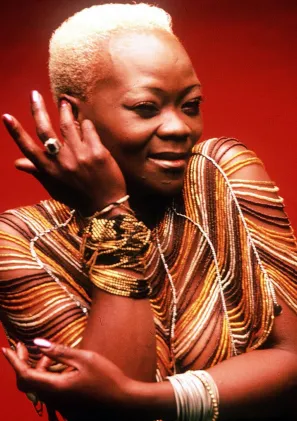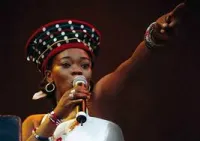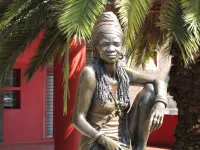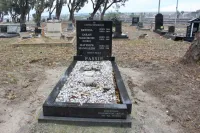Biography
1964 - 2004
“I am a shocker. I like to create controversy. It's my trademark.”
– Brenda Fassie
Brenda Fassie was born on November 3, 1964 in Cape Town and named after the singer Brenda Lee. As a toddler she began earning money singing for tourists and at church events. At 16, she left Cape Town for Soweto to pursue a singing career. She first joined the group Joy and later became lead singer for the group Brenda and the Big Dudes. She had a son in 1985 and was married briefly from 1989-1991. Her biggest hits include “Weekend Special”, “No No No Seňor”, and “Too Late for Mama”. In 1990, the outspoken singer released the single “Black President”, a tribute to the still imprisoned Nelson Mandela. She then declared that she would stop singing in English, declaring: "I am proud to be an African." Her subsequent songs were in Zulu, Xhosa and Sotho. Soon crack cocaine began to harm her career. In 1995, she was the subject of lurid press scrutiny when she was discovered in a hotel with the body of her then lesbian lover, Poppie Sihlahla, who had died of an apparent overdose. The incident prompted Fassie to enter rehab. The Afropop star would return to rehab facilities several times in her life. She released several solo albums, most of which became multi-platinum best sellers including “Now Is the Time”, “Nomakanjani”, and most notably, “Memeza”, which was the best-selling album in South Africa in 1998 and earned her numerous South African Music Awards (SAMAs). In 2001, Time Magazine wrote a feature on Fassie, dubbing her The Madonna of the Townships. On the morning of April 26, 2004, Fassie was rushed to the hospital after collapsing at her home due to a cocaine overdose. She had stopped breathing and as a result suffered brain damage. The Mandelas visited her and her comatose condition was front-page news. On May 9, 2004, her life support machines were turned off. The woman once called South Africa’s first black pop star was dead at age 39 with her family, including her long term partner, Gloria Chaka, at her bedside.
1964 - 2004
“I am a shocker. I like to create controversy. It's my trademark.”
– Brenda Fassie
Brenda Fassie was born on November 3, 1964 in Cape Town and named after the singer Brenda Lee. As a toddler she began earning money singing for tourists and at church events. At 16, she left Cape Town for Soweto to pursue a singing career. She first joined the group Joy and later became lead singer for the group Brenda and the Big Dudes. She had a son in 1985 and was married briefly from 1989-1991. Her biggest hits include “Weekend Special”, “No No No Seňor”, and “Too Late for Mama”. In 1990, the outspoken singer released the single “Black President”, a tribute to the still imprisoned Nelson Mandela. She then declared that she would stop singing in English, declaring: "I am proud to be an African." Her subsequent songs were in Zulu, Xhosa and Sotho. Soon crack cocaine began to harm her career. In 1995, she was the subject of lurid press scrutiny when she was discovered in a hotel with the body of her then lesbian lover, Poppie Sihlahla, who had died of an apparent overdose. The incident prompted Fassie to enter rehab. The Afropop star would return to rehab facilities several times in her life. She released several solo albums, most of which became multi-platinum best sellers including “Now Is the Time”, “Nomakanjani”, and most notably, “Memeza”, which was the best-selling album in South Africa in 1998 and earned her numerous South African Music Awards (SAMAs). In 2001, Time Magazine wrote a feature on Fassie, dubbing her The Madonna of the Townships. On the morning of April 26, 2004, Fassie was rushed to the hospital after collapsing at her home due to a cocaine overdose. She had stopped breathing and as a result suffered brain damage. The Mandelas visited her and her comatose condition was front-page news. On May 9, 2004, her life support machines were turned off. The woman once called South Africa’s first black pop star was dead at age 39 with her family, including her long term partner, Gloria Chaka, at her bedside.
Demography
Demography
Gender Female
Sexual Orientation Lesbian
Gender Identity Cisgender
Ethnicity Black
Nations Affiliated South Africa
Era/Epoch Information Age (1970-present)
Field(s) of Contribution
Music
Commemorations & Honors
Kora Award for Most Promising Female Artist of Africa (1996)
Kora Award for Best Female Artist of Africa (1996)
South African Music Award Winner Best Female Artist (1999)
South African Music Award Winner Song of the Year (1999)
Kora Award Jury Special Award (2001)
South African Music Award Winner Best Selling Release of the Decade (2004)
South African Music Award Winner Best Song of the Decade (2004)
Posthumous South African Music Award’s Lifetime Achievement Award (2005)
Life-size Bronze Statue of Fassie by Artist Angus Taylor Installed Outside Bassline Music Venue in Johannesburg South Africa (2006)
Demography
Gender Female
Sexual Orientation Lesbian
Gender Identity Cisgender
Ethnicity Black
Nations Affiliated South Africa
Era/Epoch Information Age (1970-present)
Field(s) of Contribution
Music
Commemorations & Honors
Kora Award for Most Promising Female Artist of Africa (1996)
Kora Award for Best Female Artist of Africa (1996)
South African Music Award Winner Best Female Artist (1999)
South African Music Award Winner Song of the Year (1999)
Kora Award Jury Special Award (2001)
South African Music Award Winner Best Selling Release of the Decade (2004)
South African Music Award Winner Best Song of the Decade (2004)
Posthumous South African Music Award’s Lifetime Achievement Award (2005)
Life-size Bronze Statue of Fassie by Artist Angus Taylor Installed Outside Bassline Music Venue in Johannesburg South Africa (2006)
Resources
Resources
http://www.sahistory.org.za/people/brenda-nokuzola-fassie
http://www.theguardian.com/news/2004/may/11/guardianobituaries.southafrica
https://www.nytimes.com/2004/05/17/arts/brenda-fassie-39-south-african-pop-star-dies.html
http://news.bbc.co.uk/2/hi/africa/3700309.stm
https://www.makingqueerhistory.com/articles/2017/2/5/the-complex-and-controversial-brenda-fassie
https://www.mambaonline.com/2014/05/09/brenda-the-2003-mamba-interview/
Resources
http://www.sahistory.org.za/people/brenda-nokuzola-fassie
http://www.theguardian.com/news/2004/may/11/guardianobituaries.southafrica
https://www.nytimes.com/2004/05/17/arts/brenda-fassie-39-south-african-pop-star-dies.html
http://news.bbc.co.uk/2/hi/africa/3700309.stm
https://www.makingqueerhistory.com/articles/2017/2/5/the-complex-and-controversial-brenda-fassie
https://www.mambaonline.com/2014/05/09/brenda-the-2003-mamba-interview/





